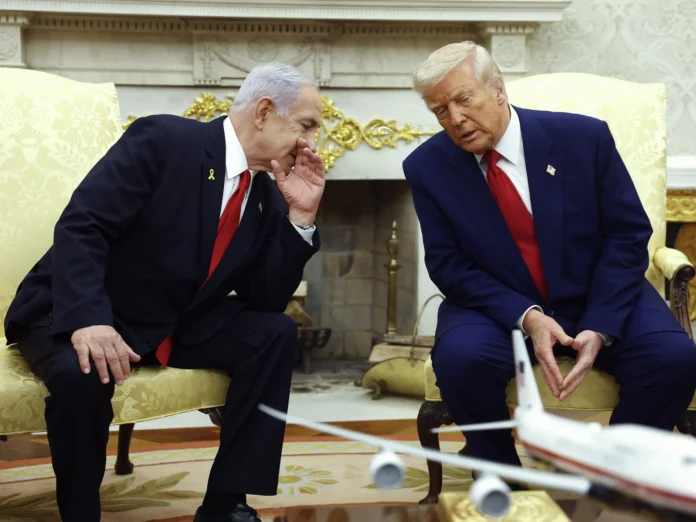Trump’s Tacit Support for Israel’s Iran Strikes
President Donald Trump seemingly exploits Israel’s June 13, 2025, strikes on Iran’s nuclear and military targets to compel Tehran into a nuclear agreement. Over 200 Israeli aircraft attacked 100 sites, seeking to destroy Iran’s nuclear infrastructure and leadership. Trump’s endorsement of the attacks, despite U.S. denials of direct participation, implies he likely knew or supported the operation. He declared, “Iran must make a deal, before there is nothing left,” revealing his strategy to pressure Iran. The attacks’ timing, during faltering U.S.-Iran talks, prompts questions about Trump’s coordination with Israel.
Israel’s Aggressive Military Operation
Israel initiated “Operation Rising Lion” on June 13, 2025, striking Iran’s Natanz nuclear facility, missile sites, and senior commanders. Prime Minister Benjamin Netanyahu, Israel’s leader, stated, “This operation will continue for as many days as it takes to remove this threat.” The campaign disrupted U.S.-Iran nuclear negotiations, with a sixth round planned for June 15 in Oman. Trump’s insistence on zero uranium enrichment mirrors Israel’s aim to eradicate Iran’s nuclear capabilities. Secretary of State Marco Rubio, U.S. diplomat, affirmed, “We are not involved in strikes against Iran and our top priority is protecting American forces in the region.”
Trump’s Revelations of Prior Knowledge
Trump’s statements indicate he possessed advance knowledge of Israel’s strike plans before their execution on June 13, 2025. He informed reporters, “Heads-up? It wasn’t a heads-up. It was, we know what’s going on.” He further admitted, “We knew everything,” suggesting significant U.S. awareness of the operation. The U.S. withdrew non-essential personnel from Middle East embassies on June 12, signaling readiness for conflict. An X post echoed this, stating, “Trump says, ‘We knew everything’ about Israel’s strike on Iran,” per user @BasedQizilbash.
Claims of U.S.-Israel Collaboration
Israeli officials contend the U.S. granted tacit approval for the strikes, challenging Washington’s claims of non-involvement. An unnamed Israeli official asserted, “We had a clear U.S. green light,” indicating close collaboration. Reports suggest the U.S. feigned opposition to deceive Iran, ensuring key targets remained vulnerable. Trump lauded Israel’s efforts, saying, “We of course support Israel, obviously, and supported it like nobody has ever supported it.” This alignment fuels speculation about Trump’s role in shaping the strikes’ strategic timing.
U.S. Messaging Conflicts
The Trump administration’s denials contradict evidence suggesting its awareness and potential involvement in Israel’s military actions. Rubio maintained, “Tonight, Israel took unilateral action against Iran,” distancing the U.S. from the operation. Yet Trump’s remarks, such as “I tried to save Iran humiliation and death… They can still work out a deal, however, it’s not too late,” blur diplomacy and coercion. William Wechsler, Senior Director at Atlantic Council, observed, “There’s clearly some confusion in the US position right now.” These inconsistencies hinder clear understanding of the U.S.’s actual role.
Trump’s Coercive Strategy Against Iran
Trump perceives the strikes as a means to force Iran into conceding during nuclear negotiations, employing intense pressure tactics. He suggested, “We are fairly close to a pretty good agreement,” implying the attacks could compel Iran’s compliance. Rubio cautioned, “Iran should not target U.S. interests or personnel,” highlighting the stakes of Iran’s response. The strikes’ disruption of Iran’s leadership aligns with Trump’s aim to diminish Tehran’s negotiating leverage. The June 15 talks in Oman now face uncertainty, with Iran promising retaliation.
Regional Tensions and Global Reactions
The strikes increase the likelihood of Iranian reprisals, potentially targeting U.S. interests due to perceptions of American involvement. Iran’s threats against U.S. forces highlight the risks, as noted by The Washington Post. Trump’s earlier opposition to Israeli strike plans, per The New York Times, contrasts with his current support, suggesting a strategic shift. An X post claimed, “Trump assisted Israel in strikes on Iran,” per user @RT_com, reflecting global suspicions. France’s plea for restraint show international concern over rising regional conflicts.
Unclear U.S. Involvement in Strikes
Trump’s conflicting roles—advocating diplomacy while possibly backing Israel’s strikes—create ambiguity about U.S. involvement, intensifying scrutiny of his intentions. He expressed a desire to avoid war, saying, “I’d love to avoid a conflict,” yet his support for the strikes suggests otherwise. U.S. foreknowledge, evidenced by evacuations and Israeli claims, points to a deliberate strategy. Rubio’s denials clash with Trump’s admissions, leaving the extent of U.S. coordination uncertain. The strikes’ disruption of nuclear talks and regional stability highlights the unresolved questions surrounding Trump’s role.

